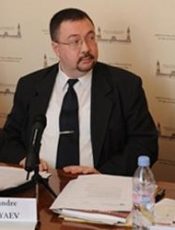February 23, 2011 is the end of Serbian Radical Party leader Vojislav Seselj's eighth year in the custody of the International Criminal Tribunal for the former Yugoslavia (ICTY).Just six days after the ICTY released an indictment signed by Carla del Ponte, Seselj fearlessly turned himself in to the Tribunal in order to prove his innocence. In contrast, the Tribunal, which, as it transpired shortly, had absolutely no evidence implicating Seselj, was in no hurry to complete the case. The ICTY invoked various pretexts to delay the opening of the trial, endlessly tailored the indictment, and violated the schedule of document releases in the hope to merge Seselj's and other cases. Attempts to deny Seselj the right to choose his own defense counsel used to be the Tribunal's most efficient means of putting the delaying tactic into practice. Last time, Seselj's defender appointed by the tribunal was withdrawn only after Seselj went on a hunger strike for 30 days.
Lacking worthy evidence, the prosecution encountered problems with witnesses who were supposed to testify against Seselj. Though the Tribunal maintains a whole squad of professional witnesses like Erdemovic, Donia, and Tabo who pop up at every trial, employing them in Seselj's case proved difficult as neither of them stood any chance in cross examinations.
Seselj's trial opened only on December 11, 2007. The hearings being permanently postponed or rescheduled, only 22 of them actually took place in 2009 and 20 – in 2010. Moreover, most of the hearings were administrative in character, without any witnesses attending. As a result, over the past couple of years the trial functioned for just 42 out of 730 days.
Even the witnesses who had been pressured into testifying against Seselj talked right at the hearings about the ICTY fabrication conveyor. As a result, the prosecution was forced to invent a pretext for another round of delays, and solved the problem by accusing Seselj of disclosing witness identities and thus obstructing justice. Simply browsing through Seselj's books written in the ICTY custody could show that the allegations were groundless, but the jury sided with the prosecution, which was predictable considering that the jury issued the arrest warrant based on the indictment authored by the prosecution despite the clear absence of evidence. At the moment acquitting Seselj would be tantamount to charging the prosecution with fabrications and judge O-Gon Kwon, who penned the arrest warrant and, by the way, currently serves as the ICTY vice president – with knowingly sealing an unfair indictment.
Unbiased and truly independent judges would have long dropped the absurd charges against Seselj, but what we see is that, facing evidence of the prosecution's mischief, the trial only probes into the feasibility of launching an investigation into it which, moreover, would target individual prosecutors rather than the prosecution as a whole. In the meantime, Seselj remains in jail.
The Tribunal turned down Seselj's request to see Russian doctors – he was told he is supposed to be treated by medics from specific NATO countries, though article 31 of the ICTY custody states that the accused should have the right to chose doctors at their own discretion. (1) At the same time, the appointment of doctors by the Tribunal to screen Seselj's health condition was delayed, and in fact not for the first time. Last October the judicial chamber ruled that its “own” doctors would check Seselj's health. The tribunal's doctors were given two months for the job, which makes the judges' integrity look dubious. (2) Subsequent developments were a total disgrace as in November the term was prolonged by another month. (3) The medical commission did not come into being by January, and the court again prolonged the term by a month. (4) Efforts are made to explain away the court's behavior with a reference to technical complications but that is simply ridiculous: now that Russian doctors were not admitted, we are invited to believe that all doctors in the NATO countries have been too busy over the period of time.
The only real technical complication is that the Tribunal is looking for doctors to treat Seselj who are ready to take part in fabrications and to commit serious offenses. Otherwise, two or three doctors would not be hard to find within a year's term. The obvious objective is to make Seselj capitulate.
Seselj's rights are violated so severely that even the judge who presided over the last hearings on January 18 said the court had done all it could and now everything is in the hands of the secretariat. The judge even suggested that the recently established Russian committee for Seselj's defense undertake the protection of the Serbian politician's rights. Altogether this is an alarming indication that decisions are being made by the Tribunal as a whole rather than by the judicial chamber. For the ICTY, this is an unprecedented scandal.
We admire Prof. Seselj for his courage and fortitude and wish him to remain strong physically and psychologically. There is only one person in the ICTY custody who is capable of defeating the criminal institution – this is Vojislav Seselj, the man who is fighting for the truth.
__________________________________________________________________________________________________________
- Rules Governing the Detention of Persons awaiting Trial or Appeal before the Tribunal or otherwise Detained on the Authority of the Tribunal, Rev. 9, 21 July 2005, // ICTY web site: http://www.icty.org/x/file/Legal%20Library/Detention/IT38UNDU_rules_rev9_2005_en.pdf
- Order To Conduct A Fresh Expert Medical Evaluation Of Vojislav Seselj, 19 October 2010
- Order Amending The Order To Conduct A Fresh Expert Medical Evaluation Of Vojislav Seselj, Filed On 19 October 2010, 17 November 2010
- Order Amending The Order Filed On 18 November 2010, 12 January 2011









